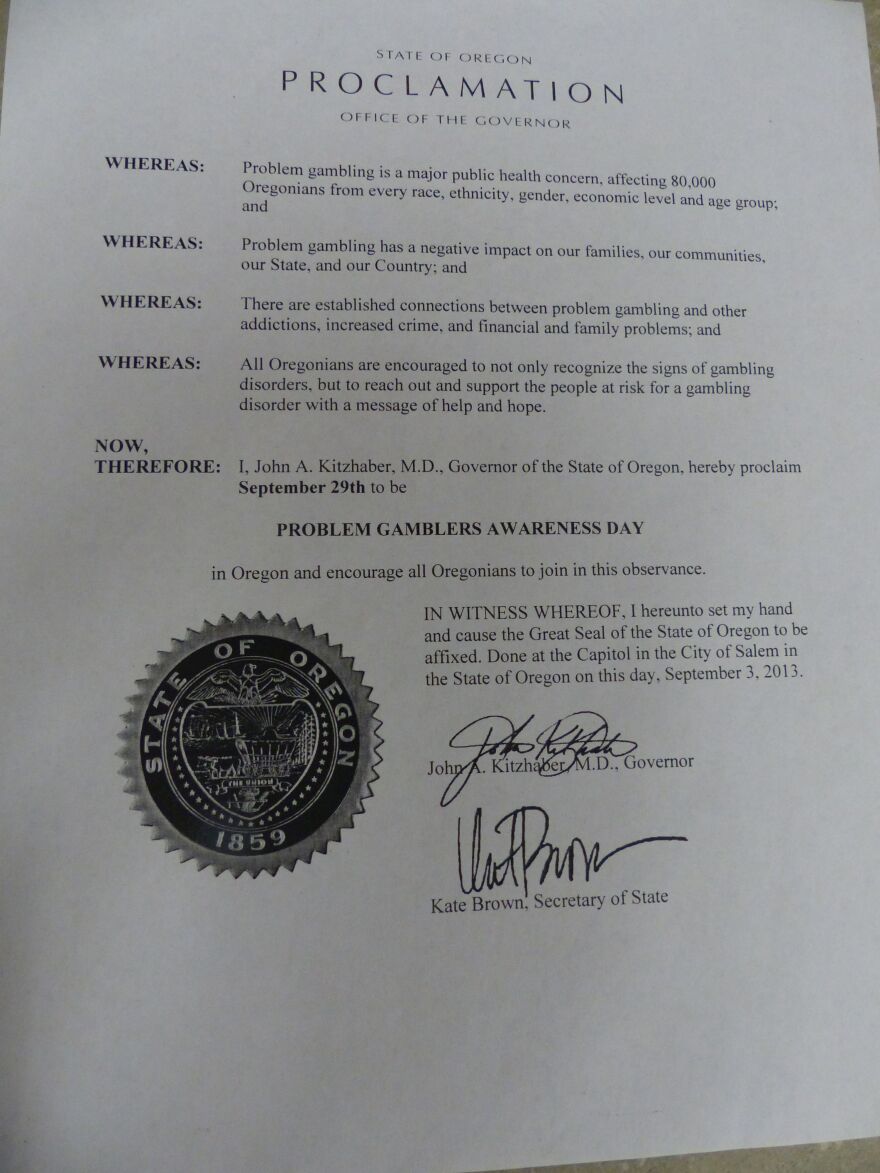Lane County has one of the highest suicide rates in the nation. The reason? Public health officials point to a growing population of high risk groups including people struggling with mental illness and addictions.
In part two of our series “Suicide Loss Survivors” -- KLCC’s Tiffany Eckert shares the story of a Eugene woman who learned—too late—the destructive nature of her brother’s addiction. And how she’s found a way to help others in his honor.
Listener Advisory: This story contains some content which may elicit deep emotions in those who have experienced suicide loss.
Reporter: Much attention is being paid to the opioid crisis and overdose suicides known as “deaths of despair.” Under the radar is another addiction—one laced with physical, mental and financial factors that contribute to suicide--compulsive gambling.
“My name is Rhonda Hatefi. My relationship to suicide loss-- I lost my brother Bobby. He was a year older than I am, we are number 4 and number 5 in our family. So we were each other’s best friends.
Bobby was a hard worker. He loved money. He loved to have money. We always called Bobby the lucky one. He is the one that would walk through the grocery store and find the dollar on the floor or find the coins in the machines.
When he turned 18 he bought a lottery ticket and he won $500.00. That kind of sparked something in Bobby. From that day Bobby started buying scratch tickets on a regular basis. Then he started playing some Keno. Then he would do the Mega bucks. But when video poker came in to Oregon in late 91 early 92 that was a way for Bobby to unwind after work. But it didn’t take long before he was going for longer periods of time. Started hocking some of things at pawn shop.
Then he started asking for money from family members. He took money from piggy banks, from his niece and nephew’s piggy banks.

On Mother’s Day in 1995, he went to my mom and said ‘I don’t know why but I’m gambling more than I should be. I think I need help.’
So she called and got him into counseling. They treated him for depression. Gave him Prozac. Told him to find something that he enjoyed doing. Which was outdoors. He was a hunter a fisherman. And so he went to my parent’s house and got the guns out of the gun safe.
In July, we as a family wanted to reconnect with him. He had kind of pulled away from us knowing that we were kind of on to what was happening. We planned a camping trip. We played baseball, we fished we hung out at the camp fire. We were all so excited to be together again.
And then 20 days later, our phone rang. And I knew at that moment that Bobby was gone. I don’t know why I knew that.
My dad and my two nephews had rode bikes over to see him because he wasn’t answering his phone.
And they found him. He had shot himself. It wasn’t something that he was in control of. At that moment he didn’t know any other way out.”
Reporter: the day her brother committed suicide, Rhonda Hatefi and her family got a call from a neighborhood 7-11. The store had been fronting bobby money to gamble and they demanded his last paycheck.
Rhonda wanted to understand what had happened to her brother. She reached out to gambling addiction support groups.
Rhonda Hatefi: “One of the first phone calls I made after we buried Bobby was to a Gambler’s Anonymous number that I had gotten. And on the other end was a machine and it was hootin and hollering, ‘Hey, if I’m not answering the phone it’s because I gambling again. Sorry!’
And I was devastated. But he called me back, the gentleman on the other side. And he said, ‘I’m a compulsive, obsessive person and that’s not something I knew about myself until the Lottery was introduced into Oregon.’ And that just rang a bell in my head with my brother.

I went to our treatment place in Eugene. It was called Aces back then, it is Emergence now. I was hearing Bobby’s story all around me. There was a lady in the group who spoke words that Bobby had written in his suicide note. Which is the hardest thing for me, still obviously. Bobby had written in his note that he felt like a ghost.”
Reporter: Out of the grief from her brother’s suicide, Rhonda Hatefi instituted Problem Gambling Awareness Day on September 29th-Bobby’s birthday. The governor signs a proclamation each year. Hatefi says her interview for an article that appeared in The Oregonian days after Bobby’s death made a lasting impact on other problem gamblers. She still hears from some who say the article saved them from Bobby’s fate.
Rhonda Hatefi: “Knowing that his story has helped other people and knowing that by sharing his story, other families don’t have to suffer the way we did. That’s what this is about. We have our Take a Break Campaign that is national. All I’m asking is for gamblers to take a step back and to make sure that they can be responsible if they are going to gamble. And if they’re not. They’re not alone. No problem gambler should stand alone. This is something I started selfishly because I didn’t want Bobby to be forgotten. And 23 years later, I can’t imagine doing anything else.”

If you or someone you love is thinking about suicide, the 24-hour Suicide Prevention Line is 1-800-273-TALK








